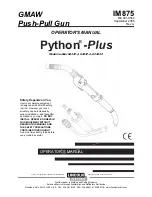
8
Federal Signal
signaling.fedsig.com
Cleaning the Enclosure
The enclosure should be cleaned periodically with a
damp cloth to maintain maximum light output. The
polycarbonate colored LED lens should be regularly
inspected for cracks. If it is damaged, it must be replaced.
Refer to the “Certification” section for any applicable
Specific Conditions of Use.
Replacing the LED Array
EXPLOSION HAZARD: To maintain the flameproof
integrity of the enclosure, DO NOT damage the lens
cover or threads while disassembling or reassembling
the beacon.
LIGHT HAZARD: To be an effective warning device, the
beacon produces bright light that can be hazardous to
your eyesight when viewed at close range. Do not stare
directly into the beacon at close range, or permanent
damage to your eyesight may occur.
BURN HAZARD: The LED array gets hot enough to burn
you. Always allow the array to cool before handling it.
STATIC SENSITIVE DEVICE: The circuitry of the beacon
can be damaged by an electrostatic discharge (ESD).
Always follow anti-static procedures while servicing the
beacon.
Tools and replacement part needed:
•
1.5 mm A/F hexagon key
•
No. 1 Phillips
®
screwdriver
•
Federal Signal LED array part no. K859500823-*.
Remove the LED Array:
1.
Disconnect the power to the beacon.
2.
Use the hexagon key to unscrew the set screw on
the housing one full turn.
3.
Remove the cover from the housing by turning
the cover counterclockwise. If the cover will not
unscrew, back out the set screw a few additional
turns.
4.
Loosen the captive Phillips screw retaining the
printed circuit board (PCB) and slide the PCB out of
the housing,
5.
Unplug the J1 connector and remove the three
Phillips screws retaining the LED array to the
mounting bracket. See Figure 11.
Figure 13 LED array and connector
J1 CONNECTOR
LED ARRAY
6.
Remove the LED array.
Install the new the LED Array:
1.
Secure the new LED array to the mounting bracket
with the three Phillips
®
screws.
2.
Reconnect J1 and slide the PCB back into the
housing.
3.
Tighten the captive Phillips retaining screw.
4.
Place the cover on the housing and tighten it by
turning it clockwise.
5.
To ensure O-ring compression, the cover must be
fully seated against the housing when the threads
are tightened. Turn the M3 set screw on the side of
the housing until the screw contacts the housing.
6.
Reconnect power to the beacon.
7.
Apply power and verify that the beacon operates
properly.
Lubricating the Threaded Joints
A silicone based, non-hardening, chemically compatible
grease can be applied if required.
Maintenance and Service
Technical Assistance:
Contact our Technical Support
Team at +1 708-587-3587 or [email protected].
Repair Service:
A return authorization is required. Contact
your Authorized Distributor or Federal Signal Customer
Support. Defective products under warranty will be
repaired or replaced at Federal Signal’s discretion.
Product Returns:
Returns require authorization from
Federal Signal. Contact your Authorized Distributor for
more information on our return policy or to request a
return.




























